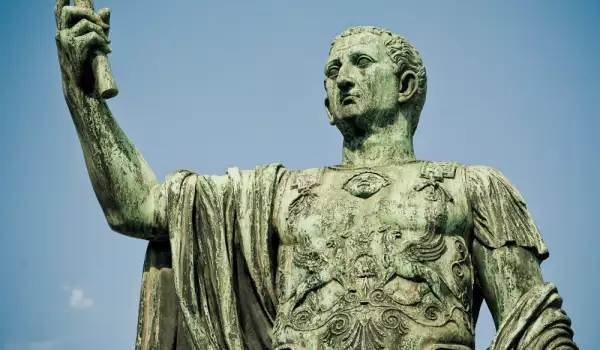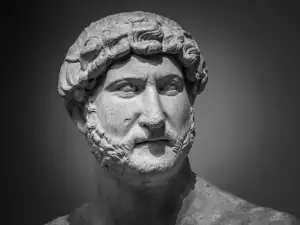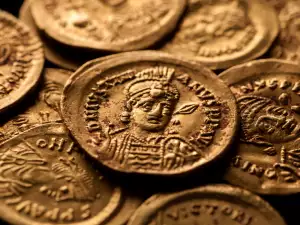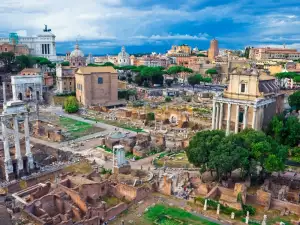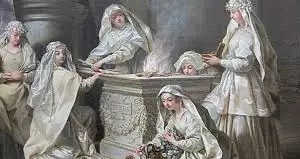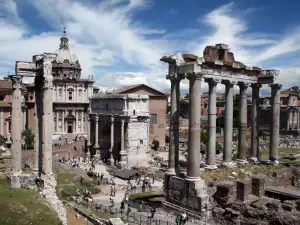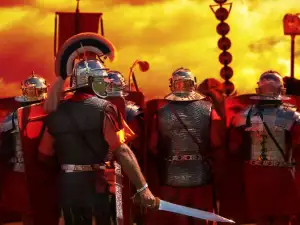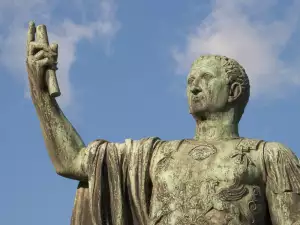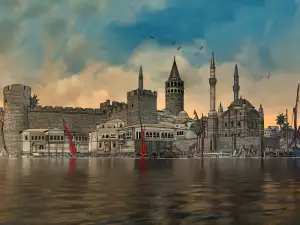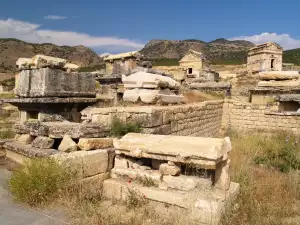The Roman Empire is one of the strongest and longest-lasting empires, marking history with significant events. It is the cause of development and positive changes in many spheres in the Western world, from laws and language to art and architecture. The preservation of this power over the years is due to the Roman emperors who ruled it, each according to their own worldview - some well, some not so much. Let's look at the most prominent of the Roman emperors, tracing their rise and fall.
Octavian Augustus (63 BC) – Nephew of Julius Caesar, which played an important role in his life. He grew up under the watchful eye of his mother, because of which he was defined as the eternal child in a man's body. She kept making him attend and do the things he did and went to as a child, which also influenced his lifestyle. A calm and cautious person who thought carefully about the moves, especially the military ones, to which Julius Caesar drew him. His arrival in Rome was also connected with the acceptance of his adoption by the family of the Julias.
Avoiding mentioning his name, he called himself Emperor Caesar Augustus. However, he is remembered in history as Octavian Augustus, since historians could distinguish him from the other descendants of the families only in this way. Unfortunately, it so happened that Rome became a center of seditiont, hunger, he tormented the people and they rose up against Octavian. After wars and battles in which he won, he managed to regain the trust of the people at home, fighting for the salvation of the Roman Empire and for justice. In 27 BC. the senate gives Octavian the honorary title "Augustus" - "benefactor". He died at the age of 76, in 14 BC. from old age. His death is quick and painless.
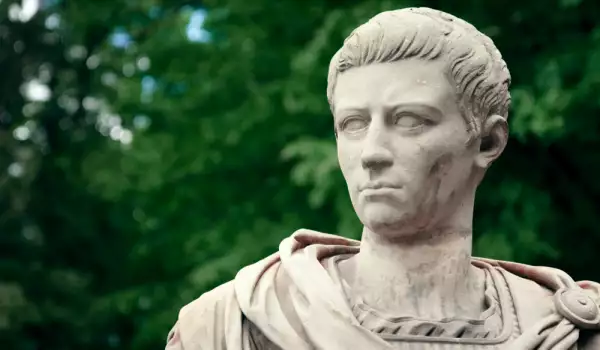
Caligula (Gaius Caesar Germanicus) - (13 BC) - Great grandson of Octavian Augustus, ruled for 4 years that were a nightmare for everyone. He is known as "The Madman" because of his despotic and careless reign. Raised as a peaceful and meek child, this changes drastically when he is adopted by his parents' killer. In the first months of his reign as emperor, he was loved by the citizens, even making donations to the poorer among them. However, an unknown illness worsened his physical and mental condition, which never recovered. Because of this, he begins to behave inappropriately, taking crazy and hostile actions. He wanted to be proclaimed God, make his favorite horse a senator, squanders the treasury, etc. He quickly loses the love of his citizens. Caligula was killed at the age of 28, in 41 BC, along with his sisters and daughter.
Claudius (10 BC) – the first Roman emperor who bought his power after giving very good remuneration to those who raised him to the title. Even though it was bought, it turns out that Claudius was a pretty good emperor, handling the position admirably, winning several wars and expanding the borders of the empire. The same cannot be said for his love life. After several wives, the fourth poisoned him with mushrooms, or at least that is one account of his death, which occurred at the age of 54.
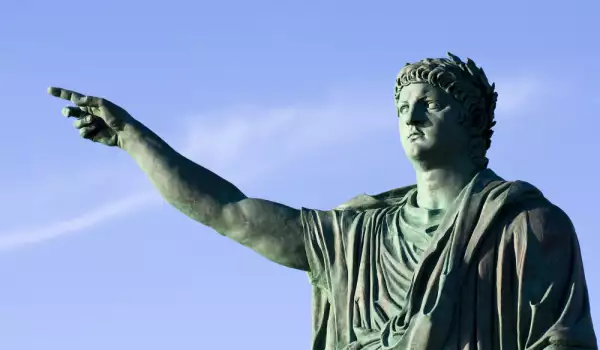
Nero (AD 37) – his reign was marked by the burning of Rome to the ground. Over the years, while he is in power, scandals, fights and murders are on the agenda. He is the youngest Roman emperor until then, which is why he indulges in entertainment related to beatings and violence against citizens. He is known for his numerous love affairs, for which he became the object of ridicule. He wins several battles and begins work on rebuilding the city, but even this does not help him win the affection of the people. He finally commits suicide, shortly before the guards arrest him in his own palace.
Vespasian (AD 9) – known for his struggle to stabilize the empire and start the construction of the Colosseum. He rules peacefully, does not enter into quarrels and wars, strives only and only for the restoration of the empire. He was the first Roman emperor to pass power directly down the family line - to his sons. Even as an emperor, he treats people with respect. He does not like extravagant lifestyle, he prefers peace and tranquility. He died in 79 AD. from a cold.
Titus (AD 39) – Vespasian's elder son who succeeded him to the throne. After a great victory, his father ordered a monument to be made in his honor, called the Arch of Titus. After the death of his father, he shared power with his younger brother Domitian. He continues the work of Vespasian - peaceful rule, seeking the approval of others. He did not issue a single death sentence while in power. His rule was also marked by the opening of the Colosseum - one of the most popular world landmarks to this day. He died in 81 AD. from pneumonia.
Domitian (AD 51) – Titus' younger brother, who is his complete opposite. He tried to expand the boundaries of the empire and succeeded several times. He relies on the policy of conquest. At some point, however, Domitian's despotic feeling took hold and he began to terrorize his citizens. Many also met their death. He began to think of himself as God and to hunt down and kill the innocent. He is killed by enemies in his palace. According to reports, he was informed of the hour of his death by an astrological prediction and on the appointed day he was restless. After repeatedly asking one of his servants for the time and being lied to because he too was part of the plot against him, Domitian sat down behind his desk and was stabbed a total of eight times.
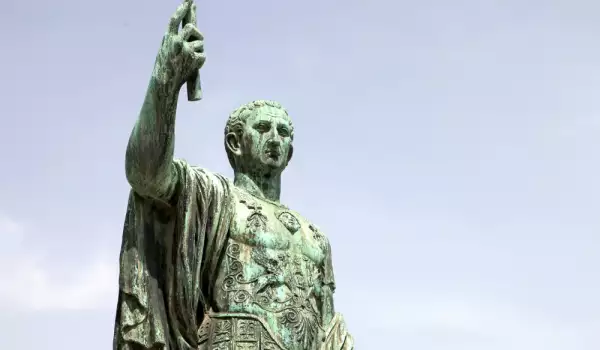
Nerva (30 AD) – founder of the dynasty of adopted emperors and the first of the "Five Good Emperors". His accession to the throne is believed to be the beginning of the "Golden Age" for Rome. He ruled a short but memorable one, uniting two opposites - the exercise of imperial power and the freedom of citizens. He created a fund to support orphans and abandoned children, gave lands and funds to poor citizens, reduced some taxes. He died in 98 AD. from stress caused by the cruel and bloody sight of his guards killing some of the people for whom he ascended the throne.
Trajan (AD 53) – A soldier of incredible physical endurance who bore failures with dignity. Even after receiving the title, he continued to consider himself equal to his soldiers-eating their food, fighting their battles as equals and leading them bravely. He was kind, humble and level-headed. He declared himself against conspirators and informers. Received the title "best emperor" from the Senate. He conquered many territories, thanks to which the Roman Empire expanded its borders. He died of a rare disease.
Hadrian (AD 76) - grew up under Emperor Trajan after his parents died. During his reign, the Roman Empire greatly strengthened its borders. He devises strategies thanks to which everyone supports and respects him, any conspiracies are foiled. He is a fan of construction, creating many roads, temples and other buildings in various places in the empire. He died in 138 AD, the cause of which is believed to be heart failure.
Antonius Pius (AD 86) – The most boring Roman emperor, considered so simply because he ruled absolutely normally. His reign was marked by prosperity, peace and tranquility. He is generous, benevolent, reasonable. He was on great terms with everyone and led a peaceful lifestyle. Died in his sleep of a fever in 161 AD.
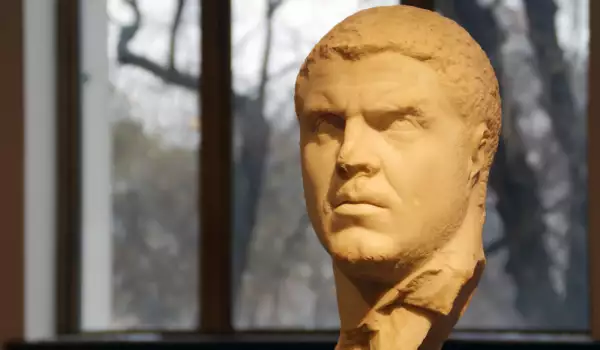
Marcus Aurelius (121 AD) – Ruled wisely, seeking to bring order to the laws and the entire empire. A highly educated person with humane principles. He denies the war, but it so happens that he has to conduct continuous hostilities. He died in 180 AD. from the plague.
Constantine I (274 AD) – the first Christian Roman Emperor. His reign is associated with the adoption of the law to end the persecution of Christians in the empire. He proclaimed Rome the capital of the Roman Empire, renaming it Constantinople. He wins many battles and had absolute power. He died in 337.
Diocletian (244 AD) - the purpose of his reign was to elevate the ruler into a cult and limit access to the ruler, which would save him from possible attempts. He rules with Maximian. He ascended the throne at a time when the empire was vulnerable and divided. Introduces the system of Tetrarchy - administration of the empire by four rulers - two senior emperors and two sub-emperors rule one part of it. He is the first ruler to abdicate – he steps down from the throne voluntarily because of his poor health. He died in 311 AD. He is believed to have poisoned himself out of fear for his life.
Maximian (AD 250) - going by the nickname Hercules given to him by Diocletian. He participated in many battles and was called Hercules, because of his courage. He remained loyal to Diocletian and abdicated with him. After two attempts to return to the throne, he was killed in 310 AD.
Theodosius I (347 AD - Emperor who imposed Christianity and banned all other religions. He was also the last to rule the entire empire after successfully unifying it, a little before he died, which occurred in 395 AD. The end of his reign marked the beginning of the Middle Ages.
Romulus Augustulus (AD 460) - last Roman emperor. He ruled for about a year and quite unremarkably. There is no exact information about his death. It is believed to have occured after 511 and before 536 AD.
